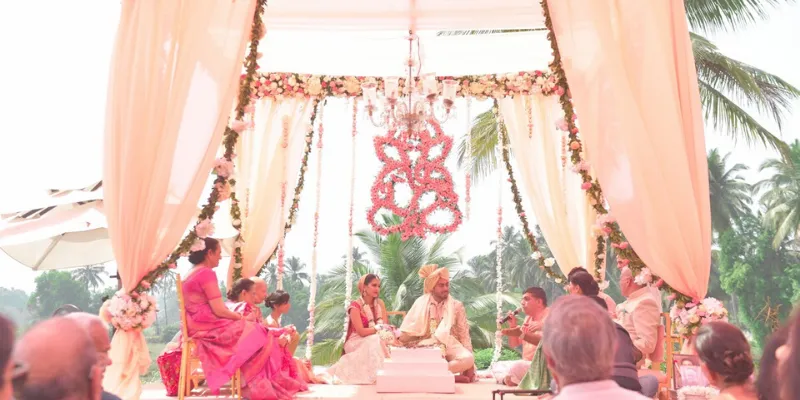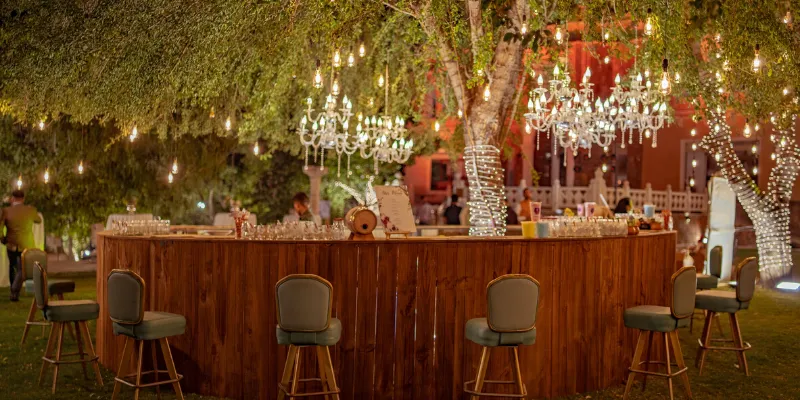Meet the globetrotter who is helping NRIs plan their dream weddings
Divya Chadha started A Klass Apart in 2008 after she realised the gap in Indian markets catering to NRI weddings. Since starting up in 2008, she has planned over 60 weddings.
Marriages may be made in heaven but planning weddings on earth is usually a tedious and long-drawn process. The big fat Indian wedding can be tougher to manage than most weddings in other countries.
Divya Chadha, a British-born Indian entrepreneur decided to tap into the NRI weddings market and their desire for destination weddings by starting A Klass Apart (AKA) in 2008.

Divya Chadha, the globetrotter planning unique weddings for NRIs.
Band, baaja, baarat
Divya, a globetrotter was born in Britain, schooled in Dubai, and went to university in Montreal. She started her first events business in London and shifted to Mumbai and started her wedding planning startup. Her global experience has helped her relate to NRIs and their wedding dreams.
Fresh out of university, Divya took up a banking job as her parents wanted her to have a ‘secure’ job. However, the 9 to 5 routine did not satisfy her. After quitting the job she set up Events Horizon Ltd, a membership-based community to access the best parties and nightlife in London. She ran the company for eight years, but when the global recession hit in 2008, she decided to pivot.
It started with a request from a client to organise their engagement and later their wedding in London led her to take up another request for a destination wedding in Jaipur. After two successful weddings, in 2018 she set up base in Mumbai by investing Rs 1.5 lakh.
“When I came to Bombay, I took a year exploring the market and realised there was a huge gap when it came to wedding planners catering to the NRI market. As an NRI, I understood the needs and requirements of NRI couples,” Divya tells HerStory.
However, the road to establish herself as an entrepreneur was tough. The initial two years were challenging for her as she didn’t speak the language well.
“When I spoke to vendors and suppliers, I knew at some level I could be taken for a ride because I struggled with understanding numbers or certain terminologies. Also, it didn’t help that I had and still have a heavy English accent,” says Divya.
The most challenging factor was the industry itself. According to a KPMG report in 2017, the Indian wedding industry is estimated to be around $40-50 billion in size. It is the second largest wedding market after the US. However, it is a seasonal industry, so it became imperative to pick the right clients.
Divya takes up only five to six weddings in a year as it takes her 12-18 months to plan a wedding. Till date, she has planned over 60 weddings. The weddings have an average budget of Rs 1.5 to 2 crore and the startup charges a management fee of 10-15 percent.

A picturesque wedding planned by Divya. (Photo credit: PhotoPundit)
What it takes to plan a wedding
The bootstrapped startup is completely run by Divya. She does not have permanent staff on her rolls. Her cousin helped her for three years with onsite work but later shifted to Spain. She has hired interns over the years to help her. She has a few key individuals who help at each wedding and are paid on a project basis.
Divya also runs a coaching business, AKA The Wedding Coach.
She says, “The key to planning a wedding is patience, the ability to multitask, the ability to gauge and balance individual emotions and having access to a large network of supportive suppliers from the industry.”
While weddings make her stay on her feet for more than 18 to 20 hours a day, she also finds time to relax and have fun. Mixing business with pleasure, her meetings are sometimes held in a pool while sipping bubbly. At weddings, she is thrown into the pool by the guests to chill off from the continuous hours of work.

An image from one of the weddings planned by Divya. (Photo credit: Manish Sharma Photography)
Challenges along the way
There are times, Divya says, when potential clients come in for meetings expecting the “boss” to be male. She has lost out on big weddings when they learn that a woman is in charge of the enterprise.
Due to her NRI background, there were many men in the industry who thought it would be okay to be extra-friendly. But, she would quickly put these people in their place.
At one of her first few weddings, she worked hard for three months for a client. At the time of the wedding there were a lot of add-on requests and she made sure that everything was met to their satisfaction. However, when she met the family to clear the extras, they refused to pay.
“I was absolutely gutted as they had shown me so much love and respect in the months prior to the wedding. I couldn’t believe they would do something like this. I took it in my stride and made it a point to go back and rewrite my contracts to ensure I wouldn’t be taken for a ride again,” says Divya.
Planning more weddings
Even though the coronavirus pandemic and the resulting lockdown worldwide has affected the wedding industry. Divya had finished her last wedding of the season in February 2020 and was in talks with a couple who wanted to get married in December, which has now been put on hold. Divya is still helping couples to plan weddings in 2021 and 2022.
Once the lockdown is eased, she believes that apart from adhering to a few social distancing and sanitising processes, her planned weddings can still offer couples a unique wedding experience.
She would be incorporating a few initiatives like recycling, donating leftover flowers rather than throwing them away, and trying to be more eco-friendly wherever possible.
This period of self-isolation has also given her the opportunity to grow and build her coaching business, which offers personal and group coaching for those looking to grow and scale their businesses. She is also developing the AKA Wedding Course, an online course for those looking to enter the events and wedding industry. She is building a platform known as ‘AKA Collective’ for her preferred destinations, venues, and suppliers around the globe.
Edited by Rekha Balakrishnan










